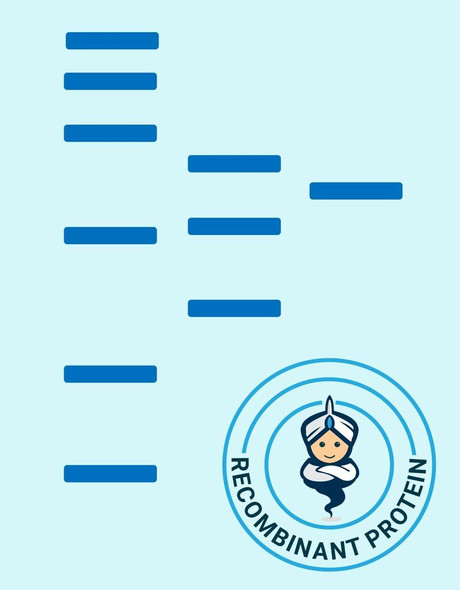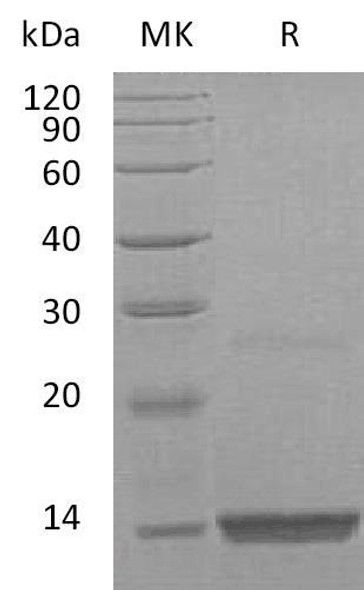Description
| Product Name: | Human PDGF A Recombinant Protein |
| Product Code: | RPPB0833 |
| Size: | 10µg |
| Species: | Human |
| Target: | PDGF A |
| Synonyms: | Glioma-derived growth factor, GDGF, Osteosarcoma-derived Growth Factor, ODGF, PDGF-A, PDGF-1. |
| Source: | Escherichia Coli |
| Physical Appearance: | Sterile Filtered clear solution. |
| Formulation: | Platelet-derived Growth Factor A is supplied in 25mM Na-Acetate, pH-4.8, 1mM EDTA and 50% glycerol. |
| Stability: | Store at 4°C if entire vial will be used within 2-4 weeks. Store, frozen at -20°C for longer periods of time. Please avoid freeze thaw cycles. |
| Purity: | Greater than 95.0% as determined by SDS-PAGE. |
The term �PDGF� refers to a family of disulphide bond-linked dimeric isoforms that act as autocrine and paracrine growth factors and are produced by a variety of cell types other than platelets.They act as potent mitogens for almost all mesenchymally-derived cells. Aberrant expression is involved in certain cancers, fibroproliferative disorders and atherosclerosis. The protein also contributes to wound healing and neural regeneration. There are four members of the PDGF family � PDGF A, PDGF B, PDGF C and PDGF D. Two distinct types of PDGF-A exist � a short form that is soluble and a long form that is retained by the extracellular matrix.
Platelet-Derived Growth Factor A Human Recombinant short chain produced in E.Coli is a non-glycosylated, polypeptide chain containing 110 amino acids fragment (87-196) and having a total Mw of 17.02kDa, with an amino-terminal hexahistidine tag. PDGF-A is purified by proprietary chromatographic techniques.
| UniProt Protein Function: | PDGFA: Growth factor that plays an essential role in the regulation of embryonic development, cell proliferation, cell migration, survival and chemotaxis. Potent mitogen for cells of mesenchymal origin. Required for normal lung alveolar septum formation during embryogenesis, normal development of the gastrointestinal tract, normal development of Leydig cells and spermatogenesis. Required for normal oligodendrocyte development and normal myelination in the spinal cord and cerebellum. Plays an important role in wound healing. Signaling is modulated by the formation of heterodimers with PDGFB. Belongs to the PDGF/VEGF growth factor family. 2 isoforms of the human protein are produced by alternative splicing. |
| UniProt Protein Details: | Protein type:Secreted, signal peptide; Cytokine; Cell cycle regulation; Secreted Chromosomal Location of Human Ortholog: 7p22 Cellular Component: Golgi membrane; extracellular space; microvillus; cell surface; endoplasmic reticulum lumen; extracellular region Molecular Function:collagen binding; protein binding; protein homodimerization activity; growth factor activity; protein heterodimerization activity; platelet-derived growth factor binding; platelet-derived growth factor receptor binding Biological Process: skin development; extracellular matrix organization and biogenesis; nerve growth factor receptor signaling pathway; wound healing; negative chemotaxis; platelet-derived growth factor receptor signaling pathway; cell projection biogenesis; response to estradiol stimulus; positive regulation of MAP kinase activity; positive regulation of fibroblast proliferation; regulation of smooth muscle cell migration; platelet degranulation; hair follicle development; positive regulation of MAPKKK cascade; cell-cell signaling; transforming growth factor beta receptor signaling pathway; positive regulation of cell proliferation; positive regulation of mesenchymal cell proliferation; response to wounding; angiogenesis; inner ear development; regulation of peptidyl-tyrosine phosphorylation; epidermal growth factor receptor signaling pathway; response to drug; platelet activation; response to inorganic substance; phosphoinositide-mediated signaling; response to retinoic acid; fibroblast growth factor receptor signaling pathway; negative regulation of phosphatidylinositol biosynthetic process; positive regulation of protein amino acid autophosphorylation; positive regulation of phosphoinositide 3-kinase cascade; positive regulation of protein kinase B signaling cascade; cell activation; organ morphogenesis; regulation of actin cytoskeleton organization and biogenesis; positive regulation of cell division; response to hypoxia; innate immune response; actin cytoskeleton organization and biogenesis; blood coagulation; alveolus development; positive regulation of DNA replication; positive regulation of cell migration |
| NCBI Summary: | This gene encodes a member of the protein family comprised of both platelet-derived growth factors (PDGF) and vascular endothelial growth factors (VEGF). The encoded preproprotein is proteolytically processed to generate platelet-derived growth factor subunit A, which can homodimerize, or alternatively, heterodimerize with the related platelet-derived growth factor subunit B. These proteins bind and activate PDGF receptor tyrosine kinases, which play a role in a wide range of developmental processes. Alternative splicing results in multiple transcript variants. [provided by RefSeq, Oct 2015] |
| UniProt Code: | P04085 |
| NCBI GenInfo Identifier: | 77695917 |
| NCBI Gene ID: | 5154 |
| NCBI Accession: | NP_002598 |
| UniProt Secondary Accession: | P04085,B5BU73, |
| UniProt Related Accession: | P04085 |
| Molecular Weight: | 22,253 Da |
| NCBI Full Name: | platelet-derived growth factor subunit A isoform 1 preproprotein |
| NCBI Synonym Full Names: | platelet derived growth factor subunit A |
| NCBI Official Symbol: | PDGFA�� |
| NCBI Official Synonym Symbols: | PDGF1; PDGF-A�� |
| NCBI Protein Information: | platelet-derived growth factor subunit A |
| UniProt Protein Name: | Platelet-derived growth factor subunit A |
| UniProt Synonym Protein Names: | PDGF-1; Platelet-derived growth factor A chain; Platelet-derived growth factor alpha polypeptide |
| Protein Family: | Platelet-derived growth factor |
| UniProt Gene Name: | PDGFA�� |
| UniProt Entry Name: | PDGFA_HUMAN |










